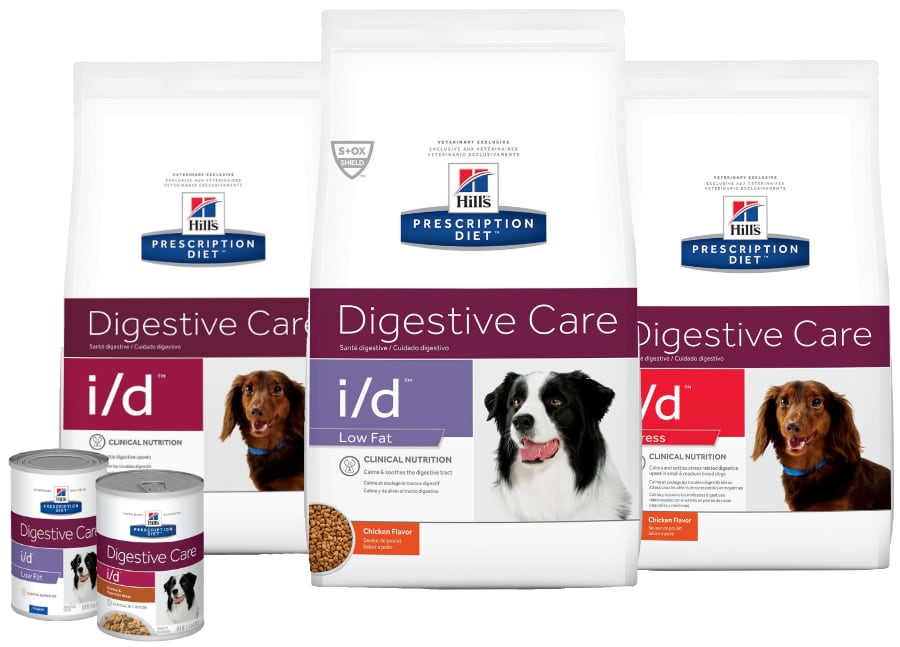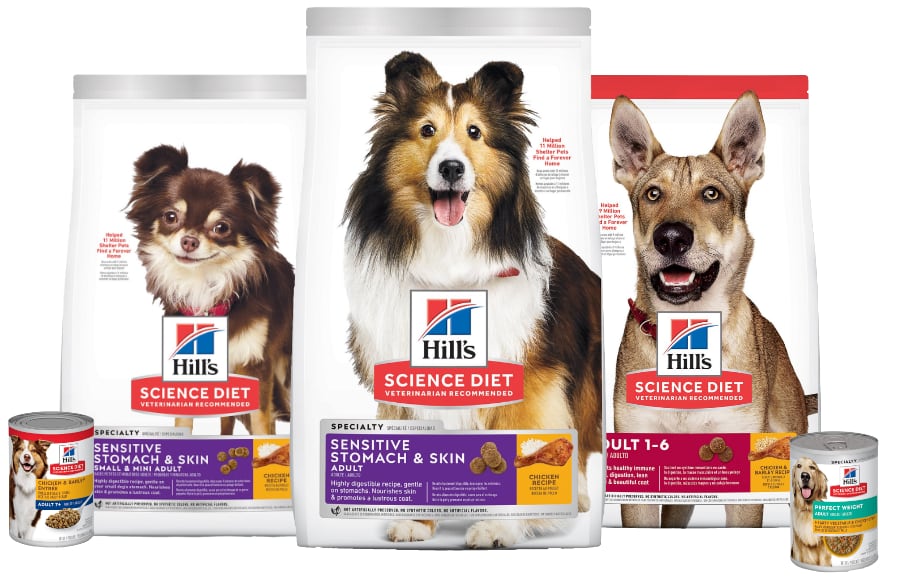Hill’s specializes in formulating recipes that support specific canine health concerns with therapeutic nutrition. The company develops all of its products with input from an experienced team of veterinary nutritionists.
When I worked in an animal clinic as a vet tech, the doctors frequently recommended Hill’s formulas to clients. But why does this brand have such an excellent reputation with veterinarians?
This Hill’s dog food review will take an in-depth look at the company’s ingredient quality and recall history to determine if Hill’s Pet Nutrition deserves its veterinary recognition.
I recommend Hill’s dog food for pets who need specialized prescription formulas to help manage chronic health conditions. Keep reading to find out why.
About Hill’s Dog Food

Hill’s follows a nutritional philosophy that science should play a central role in the formulation of canine diets. This company employs an extensive team of veterinarians, nutritionists, and scientists that continually improve their recipes based on the latest research.
The company claims to use science-backed ingredients. But, Hill’s recipes often include controversial ingredients and common allergens.
Still, no other dog food company can rival the integral role that scientific principles play in Hill’s dog food recipes. The brand uses predictive biology to pursue its mission of using nutrition to help dogs live longer and healthier lives.
Hill’s is best known for its extensive line-up of prescription diets that use targeted nutrition to address particular health conditions. These formulas require veterinary authorization, but Hill’s also offers standard recipes designed to help maintain health in dogs without special needs.
This brand has a reputation for producing dog food preferred by veterinary professionals. It’s not uncommon to find their product showcased in your local animal clinic, just like it was in the hospital where I used to work.
The high levels of trust that veterinarians place in this brand likely come from its veterinary roots and strong emphasis on scientific research.
Hill’s Dog Food History
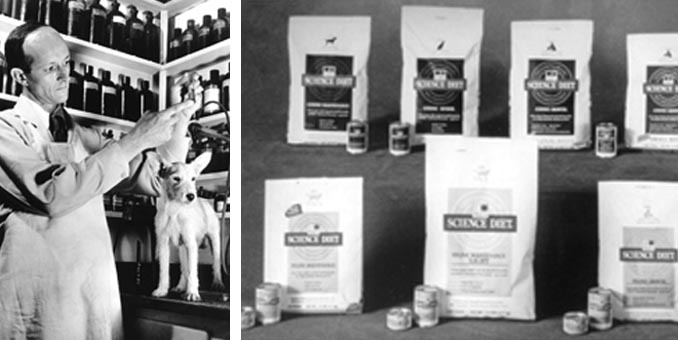
Hill’s Pet Nutrition’s unique history begins with a special dog who developed a concerning condition. In the 1930s, a seeing-eye dog named Buddy came into the care of a renowned veterinarian, Dr. Mark Morris.
The young blind man who owned Buddy brought the German Shepherd to Dr. Morris for help managing Buddy’s kidney failure. Dr. Morris diagnosed the guide dog’s condition as a result of poor nutrition, so he worked with his wife to develop a new pet food that could help.
They created Raritan Ration B in the Morris family basement, which eventually evolved into Hill’s first renal support formula. Mass production of the recipe began when Dr. Morris collaborated with the Hill Packing Company of Topeka, Kansas, in 1948.
This collaboration eventually led to the Hill’s Pet Nutrition brand’s beginning, which included offering multiple therapeutic formulas for pets. Dr. Morris began operating a research laboratory in 1951 to support the development of new scientifically-backed recipes.
Hills dog food was an industry leader when few commercial pet food companies had any veterinary oversight. The brand introduced the concept of using scientific research to create recipes that could help manage health conditions with targeted nutrition.
Dr. Morris’ son, also a veterinarian, expanded his father’s legacy by introducing a line of formulas for healthy pets in 1968. These products eventually became known as Hill’s Science Diet. Like Hill’s prescription diets, they initially became available to dog owners through their local vet.
Colgate-Palmolive Company acquired Hill’s pet food brand in 1976. Today, Hill’s offers a lineup of over 50 pet foods to pet parents worldwide. The company continues to expand today with modern advancements in pet nutrition.
Where is Hill’s Dog Food Made?
Hill’s pet food has stayed close to its roots, maintaining headquarters in Topeka, Kansas, to this day. Topeka also hosts the company’s Pet Nutrition Center and research laboratory.
Hill’s operates its main manufacturing facility in Emporia, Kansas. The state-of-the-art plant opened in 2010 and follows the latest modern safety guidelines for quality assurance. The company also manages a facility in Topeka that specializes in canned food.
There are a total of seven manufacturing plants that produce Hill’s pet food. Most formulas sold in the United States come from one of the company’s five factories based in the US. Products sold abroad are produced at their plants in the Netherlands and the Czech Republic.
All Hills factories comply with current “Good Manufacturing Practices,” which ensure that pet food is manufactured in sanitary conditions.
The fact that Hill’s produces their dog food in-house without outsourcing manufacturing processes to third parties helps the company maintain better quality control.
Hills does not provide detailed information about where they source their ingredients. But the company claims to only source ingredients from reputable suppliers that meet strict quality standards.
Hill’s Dog Food Brand Lines
After developing a reputation as a specialist in prescription diets, Hill’s introduced several product ranges designed to offer suitable formulas for healthy dogs of all ages and sizes.
While science-backed nutrition is critical for addressing health conditions, it can also help keep normal dogs healthy.
Hill’s Prescription Diets
Hill’s Prescription Diets offers some of the company’s most popular recipes. No other dog food brand offers a similar comprehensive line-up of veterinary diets with recipes designed to address specific health conditions.
The Hill’s prescription diet product line is a favorite of veterinarians. And dog food reviews from owners of dogs with special needs highly recommend the effectiveness of these recipes.
All of these products require veterinary authorization to determine if the specific recipe’s unique targeted nutrition is suitable for your dog’s needs. Prescription diets can be dangerous for healthy dogs due to the therapeutic levels of certain nutrients.
Some health conditions, like renal disease, need to be managed with low protein diets to reduce stress on weak organs. But the protein content of these formulas may not meet the high protein requirements of healthy dogs.
Prescription diets can also use specific levels of certain minerals that differ significantly from standard recommended levels. Formulas designed for minor concerns like sensitive stomachs or skin include specialized ingredients like probiotics and extra healthy fats.
Dog owners can select from wet and dry dog food varieties. Examples of health conditions supported by products in this line include metabolic issues, digestive concerns, heart disease, kidney failure, and diabetes. Hill’s also creates combined formulas for dogs with multiple health issues.
Hill’s Science Diet
The name may conjure images of mad scientists in a lab, but the Hill’s Science Diet dog food product line has serious research behind it.
The company wanted to offer the benefits of Hill’s prescription diet formulas in dog food recipes that were appropriate for relatively healthy dogs.
Science diet dog food review examples generally have positive feedback for this product line. Many veterinarians still recommend Hills Science Diet for average adult dogs.
But there is a greater variety of competitors that can offer similar or better quality dog food than the Science Diet line.
This product range features canned and dry dog food for all life stages. Unlike the Prescription diet range, Science Diet offers formulas suitable for growing puppies.
There are also formulas designed for the unique nutritional needs of different dog breeds and sizes.
Dog owners can also choose from a selection of specialized recipes that offer extra support without requiring veterinary authorization.
These formulas do not have the same therapeutic nutrition levels offered by prescription recipes, but they can still help manage minor conditions like skin issues and food sensitivities.
Hill’s Healthy Advantage
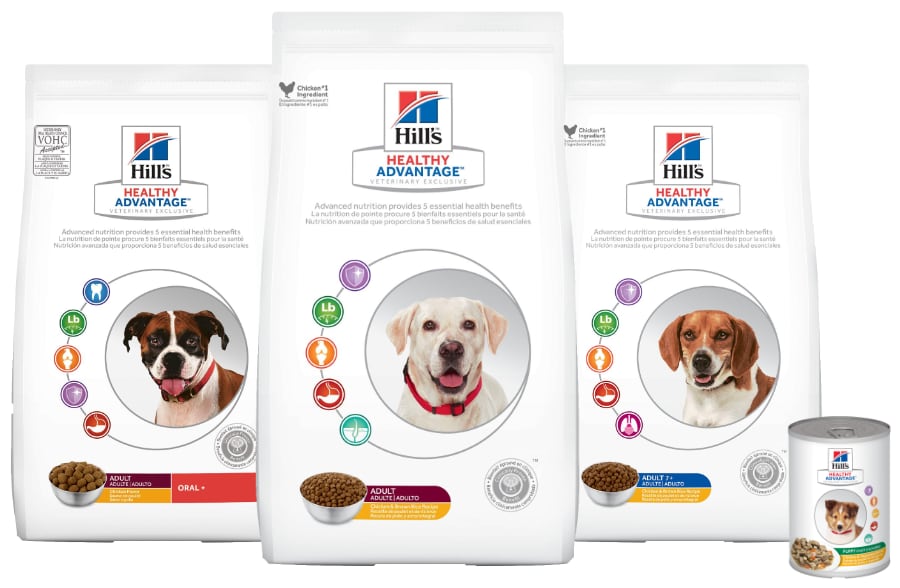
Hill’s Healthy Advantage dog food formulas are part of the company’s recent efforts to offer new innovative canine nutrition products.
This product line features recipes for adult dogs, puppies, and seniors. The line-up also includes formulas specifically for large and small breeds.
These recipes focus on providing five essential health benefits that can help improve any dog’s overall well-being. Unique ingredients include omega fatty acids for coat health, probiotics for digestive support, glucosamine for joint comfort, and antioxidants for immune strength.
Since most dogs struggle with weight management, these formulas also feature ideal caloric and macronutrient content to prevent excess weight gain. Obesity is a risk factor that can contribute to dangerous health conditions like diabetes and arthritis.
Healthy Advantage dog foods are not as widely available as the more popular product lines like Hill’s science diet dog food. Dog owners interested in trying these Hill products should talk to their veterinarian about where they can find the dog food locally.
Hill’s Bioactive Recipe
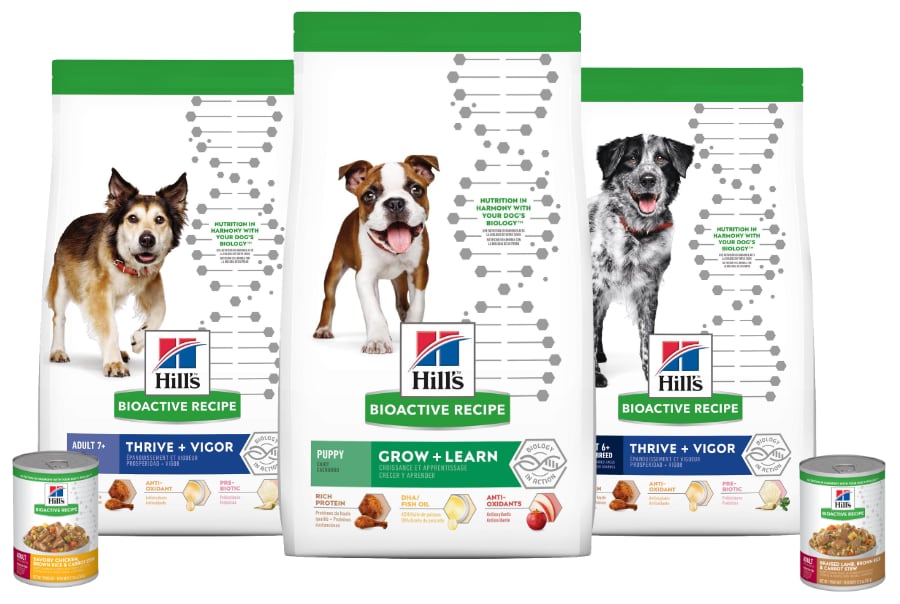
Like the Healthy Advantage dog food recipes, Hill’s Bioactive Recipe is a newer product line that is not yet widely from large retailers.
This dog food seems to be Hill’s subsequent attempt to offer dog food that uses more premium ingredients than its other products.
The Bioactive line includes formulas suitable for a wide variety of dogs. All of the Bioactive dry dog food recipes claim to use superfood ingredients backed by science.
There are several ‘superfood’ formulas available on the market today, but Hill’s emphasizes specific combinations of ingredients with scientifically demonstrated impacts of canine biology.
The Hill’s team researched the effects of certain food combinations to determine the best formulas for supporting dogs in every life stage.
Puppy recipes include DHA from fish oil to support brain development, while senior formulas have higher vitamin E levels for extra antioxidants.
Unlike other Hill’s products, these formulas do not include any soy, wheat, or corn. This makes this product line an appealing option for sensitive dogs who suffer from food intolerances.

Ingredients Quality
Although Hill’s has failed to follow through on its quality standards before, it claims that they analyze all ingredients’ nutrient profiles before manufacturing. Hill’s uses safe ingredients to produce balanced recipes. But its ingredient quality is below average for the cost.
Despite a successful climb to the top of the pet food industry based on veterinary referrals and recommendations, the brand has experienced a slow decline in the past decade.
Most industry experts attribute this trend to increasing consumer demand for natural ingredients.
This boring-sounding brand found itself lagging behind companies that pitched natural and ancestral diets. Hill’s responded by reformulating their recipes to exclude artificial colors, flavors, and by-product chicken meal.
The company also began emphasizing higher-quality animal proteins as the first ingredient in most of its formulas. Some of Hill’s prescription diets can not use meat as a primary ingredient due to therapeutic protein requirements for specific conditions.
However, Hill’s has also rebuked the marketing efforts by other dog food brands that produce natural dog foods. They claim that the term ‘natural’ doesn’t have a significant meaning that makes those formulas a healthier option.
The scientific research that goes into Hill’s products makes them an excellent choice for dogs with special needs. But I generally don’t recommend these recipes for healthy dogs due to the lower ingredient quality compared to other dog food brands.
All Hill’s recipes use safe ingredients commonly found in traditional dog food to meet AAFCO’s daily nutrient recommendations. Pet parents can depend on this brand to provide their dogs with balanced nutrition, but the ingredients may not be suitable for more sensitive dogs.
Common allergens like wheat, soy, and corn appear at the top of the ingredient label found on most of Hill’s formulas. These products are inexpensive ingredients used to achieve appropriate nutrient content at the lowest cost possible, but they can cause food allergies and intolerances.
Yet, Hill’s dog food is significantly more expensive than some foods that use higher quality ingredients. When you buy a dog food formula from Hill’s, you’re paying for all of the additional research that went into developing that formula.
It’s possible that the price point of Hill’s dog food products would become inaccessible to most pet owners if they used more premium ingredients.
The company introduced a product line marketed towards consumers who valued natural ingredients in 2013. But Hill ultimately discontinued the short-lived line, Hill’s Ideal Balance, in 2019 after disappointing sales.
Hill’s Dog Food Recalls
Hill’s does have a dog food recall history that includes several recalls of its products in the past decade.
Most of the Hill’s recalls only impacted their canned products, not their dry dog food. Here is a list of recent recalls of Hill’s dog food.
- January 2019 – An FDA report revealed elevated vitamin D levels in specific Hill’s Science Diet canned food formulas resulting in a massive recall. Unfortunately, several dogs passed away after eating the affected products. [1]
- November 2015 – Hill’s Pet Nutrition issued a market withdrawal of certain lots of their Hill’s Science Diet canned dog food recipes due to a minor unknown issue. A market withdrawal is not technically a recall, so it is not subject to action from the FDA.
- June 2014 – The FDA recalled Hill’s Science Diet Adult Small breed dry dog food due to the potential for salmonella contamination. [2]
You can learn more about any dog food product recalls on the FDA website.
Legal Issues and Controversies
Hill’s Pet Nutrition has experienced some recalls and legal issues in the past. But most of the controversies surrounding the company involve Hill’s research dogs.
Canine Research at Hill’s Pet Nutrition Center
The pet nutrition center houses a resident population of companion animals that work with the Hills team of scientists to test new products. Although some pet owners may be uncomfortable with Hill’s furry research team, the company remains committed to animal welfare.
Hill’s has faced some controversy by keeping their canine research subjects at its facility for their entire lives. Just like many people, I have concerns about animal research. But most sizeable canine nutrition companies have to use dog populations for researching their products.
Pets at the center enjoy a relatively high quality of life with expansive living and play areas. Research dogs also can interact with other dogs and humans, often developing a strong bond with their caretakers.
There are plenty of dogs out there who need love and care. And Hill’s is incredibly open about the quality of life enjoyed by their research dogs in Topeka.
These pups help ensure that your pet gets the best nutrition possible, they are well looked after, and they are never subject to invasive research methods.
Vitamin D Toxicity
Hill’s dog food products have also been subject to FDA recalls in the past. The worst recall occurred in January 2019 when investigators discovered some of Hill’s canned dog foods had toxic Vitamin D levels.
The FDA warned that Hill’s failed to follow their safety guidelines, resulting in the deaths of hundreds of dogs due to supplier error.
Hill’s has cooperated with the FDA’s recommended corrective actions, but they still faced a lawsuit from hundreds of upset dog owners over the incident.
Our Verdict
This Hill’s dog food review provides insight into why Hill’s Pet Nutrition is a top brand consistently recommended by veterinarians.
The scientific research done by Hill’s veterinary team has allowed the company to produce effective formulas with targeted therapeutic nutrition.
I recommend Hill’s dog food for dogs that need a specialized prescription diet to manage chronic health conditions. Hill’s offers an unrivaled selection of prescription diets. But their Hill’s Science Diet formulas for healthy dogs contain below-average ingredients for the cost.
Talk to your veterinarian before making any changes to your dog’s diet. Chances are, your vet is also a fan of this reputable company.

